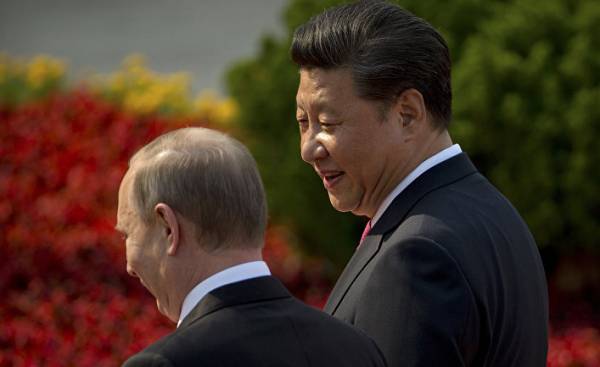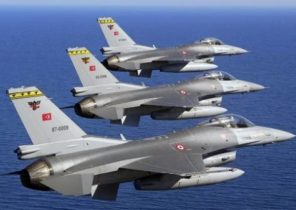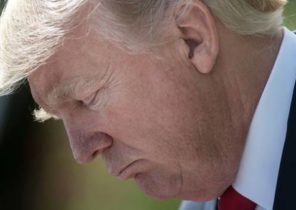
Opposition and resistance to the dominance of the West in global politics was fed by the Russian-Chinese relations over the past two decades. And still their reaction and long-term expectations are significantly different from each other. Russia, it seems, gets the pleasure from internal problems of the West, extracting the maximum benefit from the change of priorities in the direction of populism and anti-globalization. China also stands as a staunch supporter of globalization, seeing the instability in the Western political environment with a mixture of Schadenfreude and genuine interest.
Two views on globalization
The recent speech of the President of Russia Vladimir Putin and President XI Jinping respectively illustrate the difference between the attitudes and expectations of Russia and China. Si has been a key supporter of globalization and free trade, and Putin, as we see, claims the title of the main enemy of globalization and mainstream (although it now competes with Donald trump after winning the presidential election in the United States). Speaking at the meeting in October 2016 annual meeting of Russian and international experts on post-Soviet politics, Putin criticized globalization. He praised her as a project in crisis, led by a selfish elite that left the majority with no hope to get out of poverty and despair. Multiculturalism, according to Putin, also fails, particularly in Europe. XI Jinping, in turn, suggested effective measures in defense of globalization. In his speech at the world economic forum in January this year, he argued that globalization not to blame for all the problems of the world and warned that turning globalization into reverse is impossible: “any attempt… to direct the water from the ocean back to isolated lakes and streams is just impossible.”
These differences cannot be reduced to simple rhetoric. Russia cherishes the growing political and economic chaos in the West and, according to many commentators, decided to actively support destabilization. The Russian elite did not hide his satisfaction with the victory of the trump in US elections. The Kremlin was delighted with the decision by the United Kingdom to leave the European Union, considering it as a first step towards further collapse of the political and economic agenda of post-war Europe. Over the years, Russia has created a network of contacts with the European far right and, to a lesser extent, ultra & political parties, basing their influence among such forces.
China, by contrast, prefers the stability and gradual changes. Beijing has advocated that the UK remained in the EU. China has repeatedly stated its support for European unity and condemned the rise in Europe of populist forces. With regard to the presidential elections in the United States, the consensus in China is still not achieved. The state media presented the controversial campaign of trump and the ensuing victory as definitive proof of the inevitable weakness of democracy. And although Hillary Clinton in Beijing took not especially warm — because of its contribution to the reorientation of U.S. policy in Asia, she won the elections, it would bring much more predictability in Sino-U.S. relations.
Why the approaches of Russia and China to globalization and the West so different? These differences may seem surprising, given that the views of the two countries on a global scale are very similar. Both jealously guard their sovereignty which is understood as a carte Blanche in domestic politics, and I suspect the West in the preparation of regime change under the banner of spreading democracy and human rights. Both countries are selective when it comes to international law, which they are willing to comply, especially in regard to neighboring countries. But one of these modes is planning to flourish due to the deepening chaos and the other trying to preserve some sort of international stability.
Preference Russia uncertainty
The shortest answer to the question why Russia prefers the instability is that the damage it will incur in case of unpredictability in the West will be small. Unlike China, which over the past three decades made a huge jump and benefited from by a Western-led globalization, Russia acquired not so much. Her first reincarnation after the collapse of the Soviet Union — showed ideas based on the rules of market economy and political democracy in the eyes of Russian society and elite. It took two decades before Russia joined the world trade organization (WTO). During membership in the G8, Moscow remained out of work, when it came to discussing financial and economic issues. She was unable to join the Organization for economic cooperation and development (OECD), the club of developed countries. Weapons and energy resources were the only real assets of Russia during the search for a niche in the international division of labour.
Beijing may not like the Western liberalism and its emphasis on human rights and democracy, but to deny that the opening of the West in the global economy paved the way for his rise, he can’t. In addition, the Putin government bases its legitimacy on economic growth in a slightly different degree than the Communist party of China. In 2000-ies, the Russians traded political freedom for a better quality of life, and in the current decade the “social contract” between the Kremlin and Russian society dictated in large part by the way the great powers and foreign policy successes. European unity also Russia led to the expected benefits. For the Kremlin it was more of an obstacle to the achievement of political and economic agreements with individual European States. For example, the fuel and energy complex (in particular, gas exports), for “Gazprom” the unity of the EU — not even God knows what was the main stumbling block. The Russian company has faced accusations of using their monopoly position, long-term contracts were blocked, and access to pipelines is limited. If not the unanimous decision of the EU, a number of European countries have long recognized the Crimea and canceled the sanctions imposed on Russia in the aftermath of the crisis in Ukraine. From this point of view, the British exit from the EU opens not only the immediate benefits, such as diverting attention from the EU in Ukraine, but also increases the likelihood of separation of Europe.
Support by the Kremlin of European populist intellitronic and extreme right parties with a high risk was also not associated. Conservative ideology adopted by the Kremlin after Putin’s return to power in 2012, the protection of traditional values and religious roots of European civilization, the contempt for the EU and ties with radical parties make Russia less vulnerable to rising in Europe populism. The leaders of many of these movements openly declared the support of “effective leadership” of Putin, see Russia as the last bulwark against the downgrading of Europe and identify themselves with anti-American foreign policy of Russia.
Win Donald trump — even assuming that Moscow on it had no effect — creates a tempting vision of the long-awaited “Grand bargain” between Russia and the United States. Moscow can really count on the lifting of sanctions and recognition to some extent of the annexation of Crimea. Even if both parties will not be able to fully accept the “deal” has already been unleashed on the West, the election trump the chaos will help Russia to achieve its long term goal of splitting the transatlantic relationship. It can be expected that the ambiguous position of the trump NATO and its open hostility to the EU will create unprecedented since the war in Iraq in 2003, the gap between the two shores of the Atlantic. At the same time, protectionist economic policies trump a considerable damage to Russia will not bring, given the low level of bilateral trade and investment.
Russia’s political leadership recognizes a number of potential benefits from the deepening crisis in the countries of the West. Their instability makes it easier for the Kremlin with the task of prosecution in the Russian failures the rest of the world, and allows you to mobilize public support against the new world “disorder.” It would be easier to divide the West by careful selection of potential partners. Russia is ready to adopt anti-globalization movement, to whip up resentment and fear against supranational officials, the world’s oligarchs and global corporations. The use of terms such as “simple man” and “the silent majority”, allegedly deprived of the right to vote to its own elite, portrays Russia as something quite different from the allegedly corrupt Western elites detached from their own societies.
The loser is China?
China is in a totally different position. The decline of the West can stop the steady rise of China. Beijing would lose more than Moscow, and not only because EU and USA are China’s trading partners number one and number two. Trying to get some advantages from the differences within the EU, China continues largely to support the European integration. The Euro offers a counterweight to the hegemony of the US dollar, and the EU is committed to providing China’s place in the international order, as evidenced by the mass appeal in the Asian infrastructure investment Bank.
Meanwhile, utilitaria parties across Europe perceive the economic expansion of China as a major source of economic stagnation and job losses in Europe. Anti-dumping tariffs by the European Commission, aimed at the production of steel by China, are the first signs of protectionism; and Beijing hopes that he will prevail in the economic policy of Europe, if the extreme right and extreme left-wing parties will seize power in the various member States of the EU. For China, the first warning sign was the success of the anti-globalization parties in the European Parliament elections 2014.
The potential loss of China illustrate the result of the referendum about the EU exit of the UK. Its new government, headed by Theresa may, which replaced the team of Chinese experts David Cameron and George Osborne nearly took China’s first nuclear investment in developed countries of the world: NPP Hinkley point. The new Prime Minister has postponed the decision of his predecessor, identifying omissions in respect of foreign investments in strategic sectors. It remains unclear whether the revised Mei its decision because of pressure from China, but an open letter to the Chinese Ambassador in the UK left little doubt of retaliatory action by Beijing in case of blocking by a London investment. Nevertheless, China clearly suffered paper losses.
The same logic applies to the relative preference for China Hillary Clinton in front of Donald trump. Trump had just a few tweets and one phone conversation with the President of Taiwan to undermine the foundations of Sino-American relations. Trump, it seems, neglects caution in relation to Beijing and is willing to use as a bargaining chip policy of “one China” policy, under which Washington maintains official ties with Taiwan. In addition, his rhetoric against free trade is aimed directly at China. A trade war would undermine Chinese exports, especially given the fact that the United States is China’s largest foreign market and source of trade surplus. Even the eventual collapse of the American system of alliances in East Asia, which would strengthen positions of Beijing in regional geopolitics, problems can bring not less, than benefits. If trump had stuck to his threat to get rid of Asian America’s allies (which is quite possible), other States, such as Japan, could begin to remilitarization.
The Communist party of China needs a capitalist system as much as despises Western democracy. China relies on open trade and stable markets, and the growing or at least shrinking — the welfare of Western consumers. He needs favorable external conditions in order to sell the entire range of products, from low price segment to the upper one, such as high-speed trains for export of excess capacity of its industry and investment from its crowded in the dollar bins. In other words, China needs the next wave of globalization, and to prevent the isolation of other States.
A responsible great power
Different answers to the challenges of globalization and internal challenges of the West, can lead to differences in the roles of China and Russia in world politics. For many years the West was considered the last “stowaway”. China took advantage of the West without much cost, be it monetary or human. Against the background of “Brekzita”, trump and growing in Europe populism China must uphold the principles of globalization. At the same time, and he has determined to share Western values, namely the liberal democracy.
Recent events in the West have only strengthened the conviction of the Chinese elite in the effectiveness of the current Beijing regime. He offers political guarantees an open, global economy and has already begun to take on some responsibility, highlighting, for example, more troops for peacekeeping missions. Unresolved remains the question whether it is possible simultaneously to support liberal internationalism abroad and to take tough measures against the opposition in the country. If China succeeds, he may be able to achieve what has not achieved the West is to persuade Russia that the international order aimed at achieving their own interests.
Marcin Kaczmarski is assistant Professor at the Institute of international relations, University of Warsaw and head of the program “China-EU”, Centre for Eastern studies.







